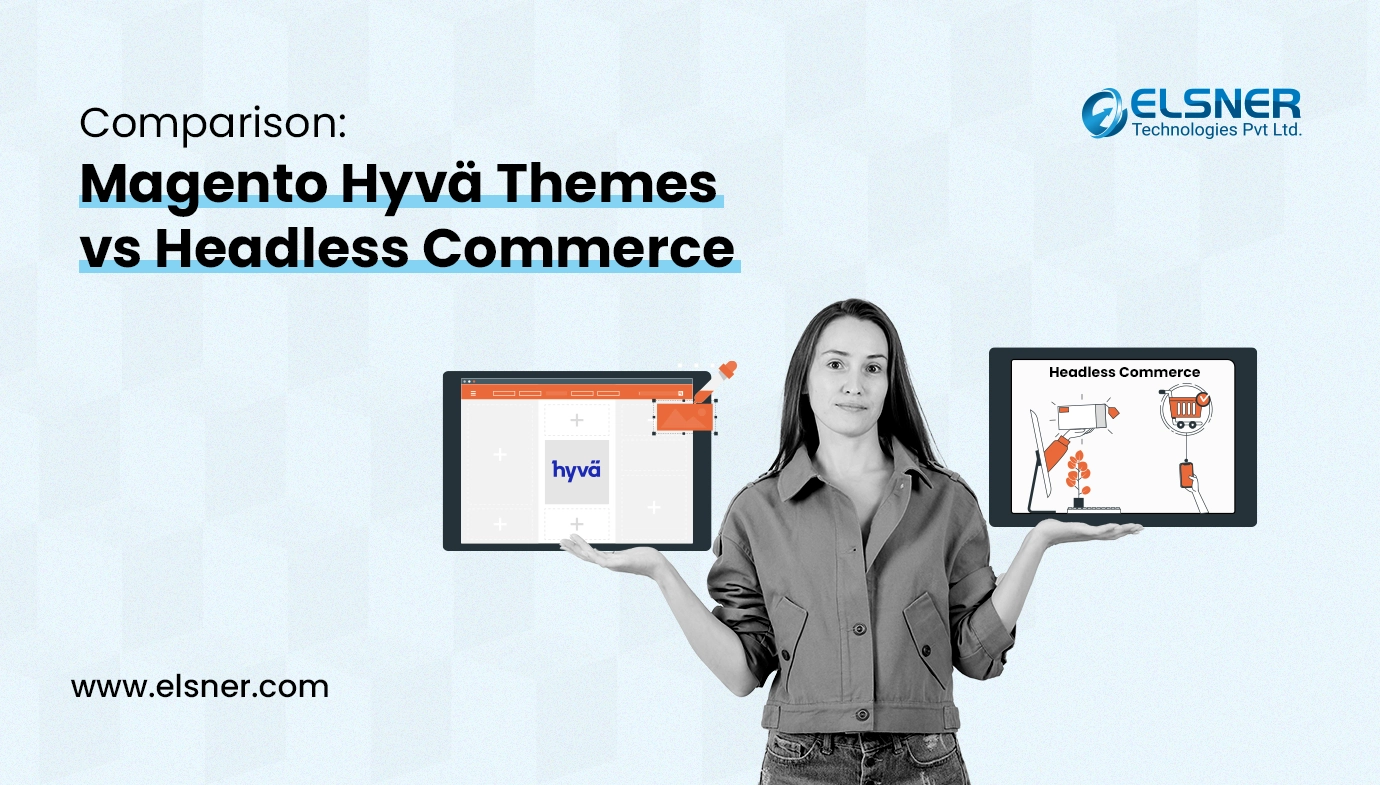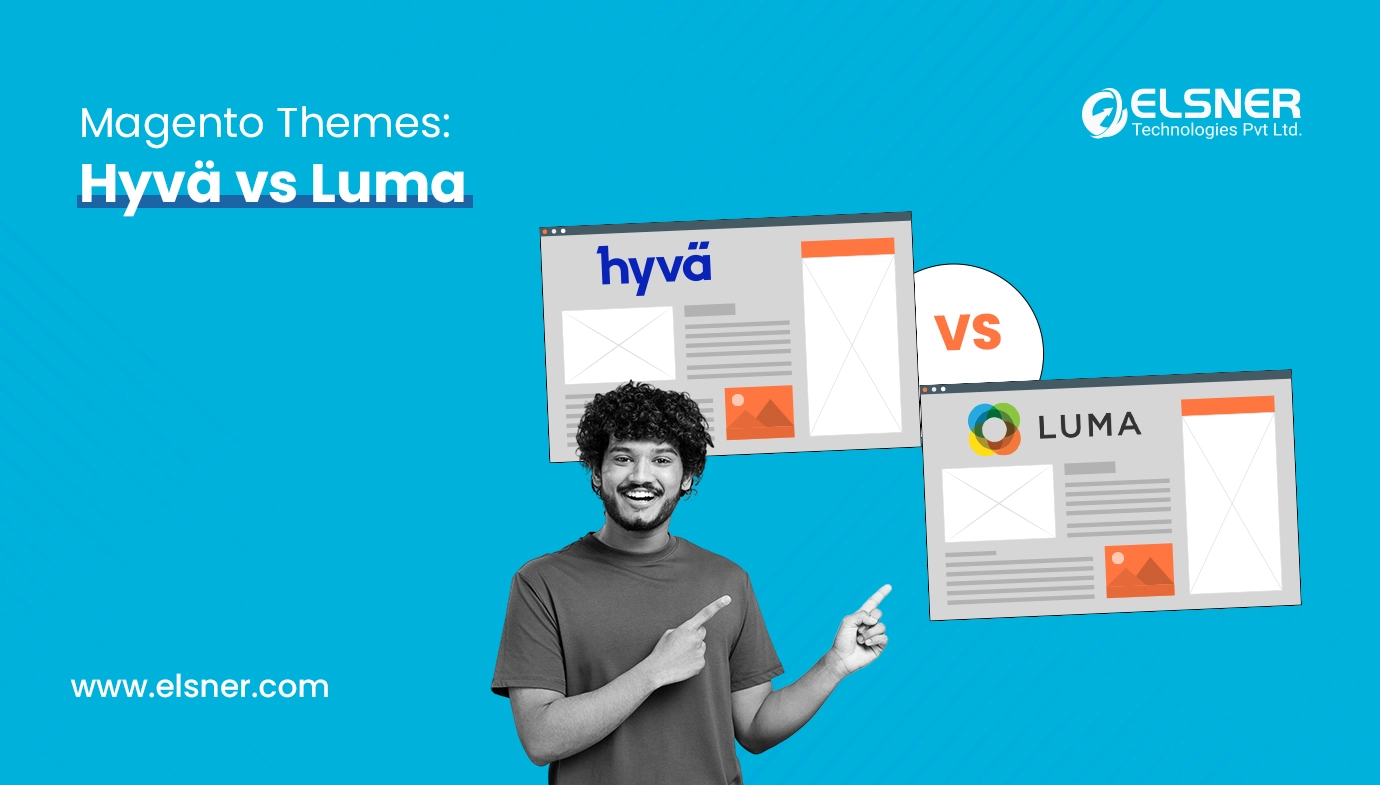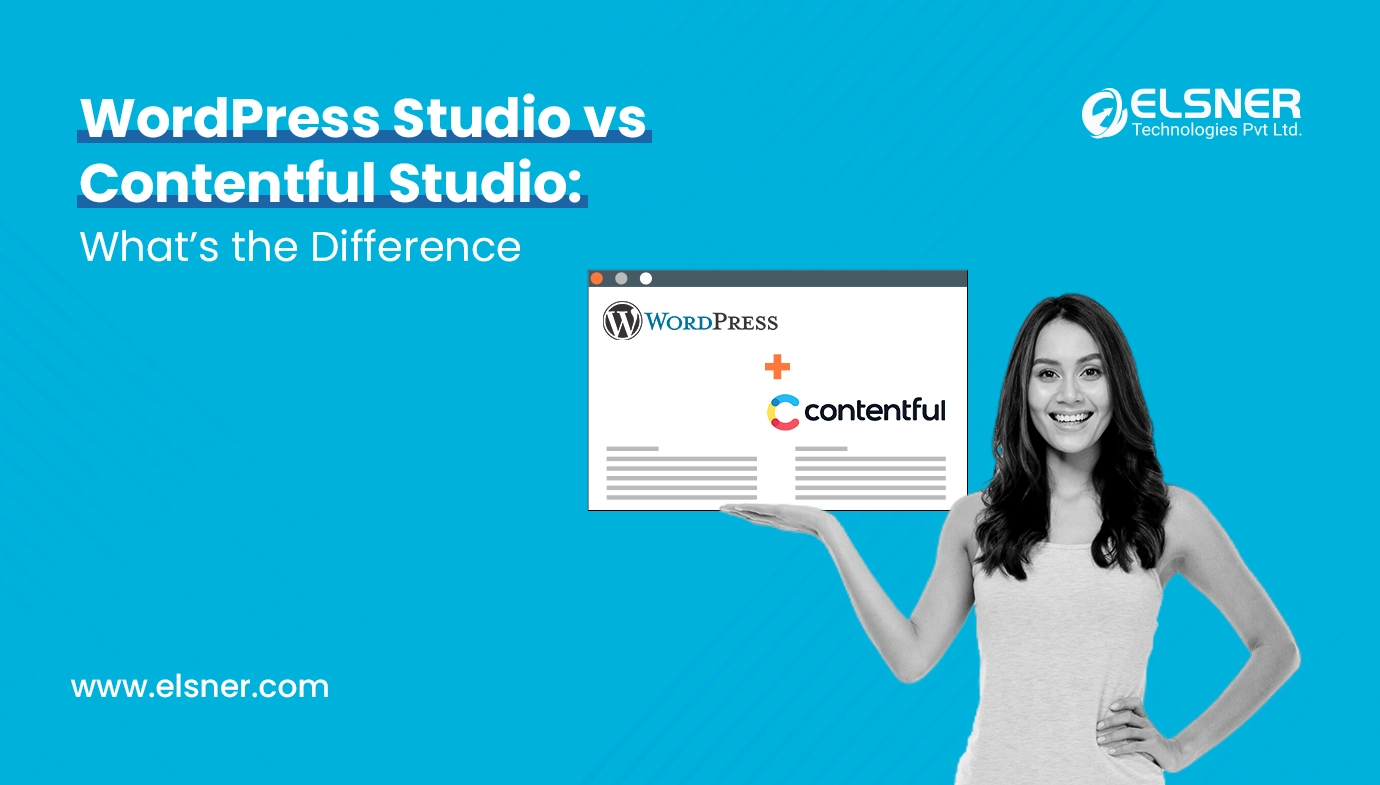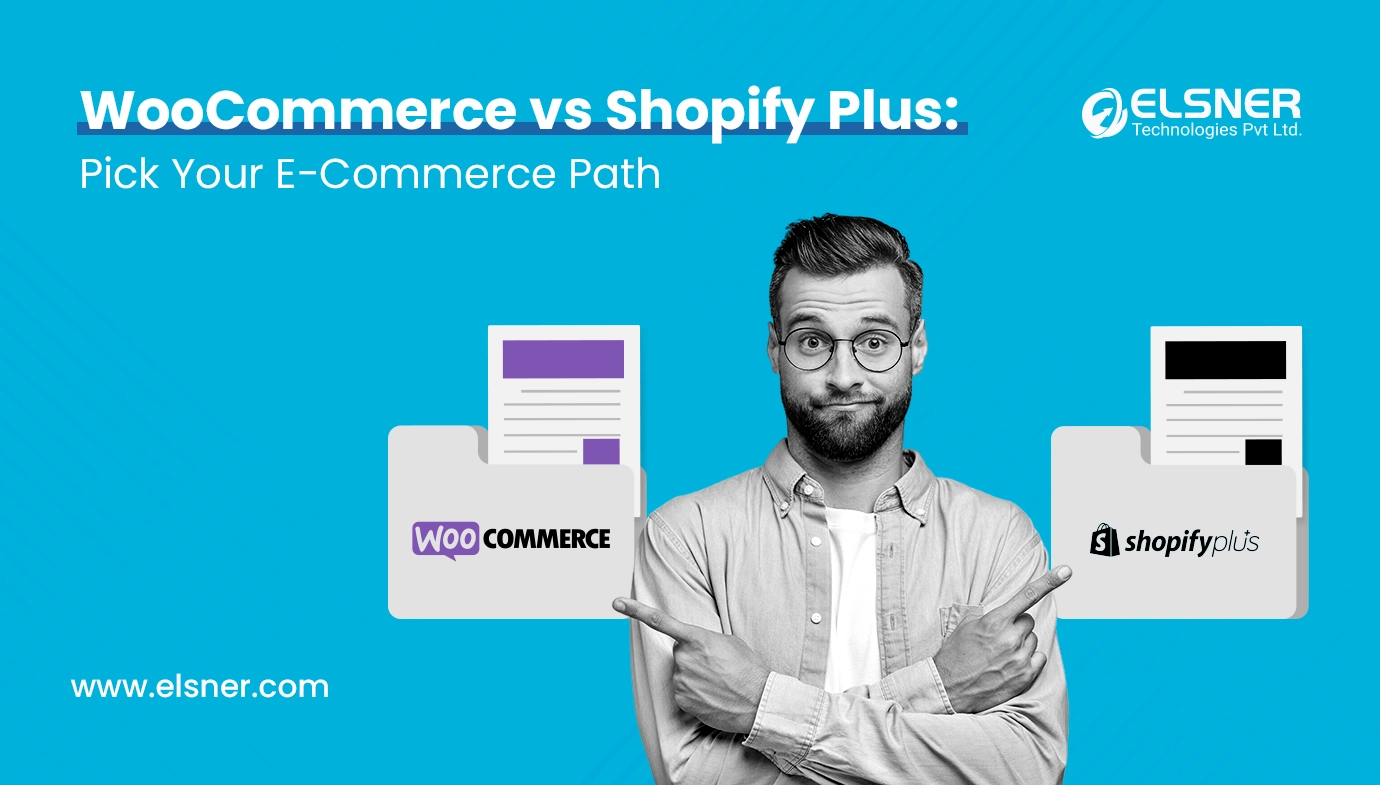- Unveiling Details about Magento Hyva Themes
- What are Magento Hyva Themes?
- What are the Key Features and Benefits of Using These Themes?
- Exploring Headless Commerce
- What is Referred to as Headless Commerce?
- What are the Key Advantages and Use Cases?
- Comparative Analysis
- 1. Flexibility
- 2. Scalability
- 3. Performance
- 4. Customization and Innovation
- 5. Development Complexity
- Concluding Thoughts
Do you plan to revamp your Ecommerce store with top-notch design and smooth performance? If yes, you can go for Magento Ecommerce development services. In the present years, there has been considerable evolution of Ecommerce over the years with the emergence of different approaches and platforms for catering to distinct requirements of Ecommerce businesses. The two most popular approaches in the Ecommerce development landscape are Headless Commerce and Magento Hyva Themes.
If you are looking forward to making a choice between these two platforms, then you may end up getting confused. You may be thinking about which particular option is the ideal fit for your business. We have come up with this detailed guide to clear all your related confusion. Here, we will do a detailed comparative analysis of both these approaches so that you can make a well-informed decision. So, before you hire Magento expert, it is suggested to read this guide from the start to the end. Let’s begin:
Unveiling Details about Magento Hyva Themes
What are Magento Hyva Themes?
Magento Hyva Themes are referred to as a contemporary approach to frontend development, typically within the Magento ecosystem. These aim to improve the developer offering Magento Ecommerce development services and experience and boost frontend performance as it involves the adoption of best practices along with modern frontend technologies.
Not only that, but Hyva themes even leverage the backend infrastructure of Magento while also providing unmatched efficiency and flexibility in frontend development. If you need any related aid, you can choose professional Magento enterprise development solutions.
What are the Key Features and Benefits of Using These Themes?
Implementing Magento Hyva Themes comes with many interesting advantages. Let’s discuss these benefits in detail, along with their key features, in the following section:
Better Developer Experience: Hyva Themes are known for effectively streamlining front-end development tasks, making it easier for developers to craft custom designs along with layouts.
Improved Performance: By reducing needless bloat and optimizing frontend assets, Hyva Themes can dramatically enhance page load time and overall performance.
Design Flexibility: Developers who are inclined towards offering best-in-class Magento 2 development services get the flexibility to craft highly tailored designs and layouts as per the specific needs of the Ecommerce store.
Compatibility with Magento Ecosystem: Since Hyva Themes works within the Magento ecosystem, it integrates well with Magento’s backend functionalities, modules, and extensions.
Exploring Headless Commerce
What is Referred to as Headless Commerce?
Headless commerce is known to be an architecture in which there is the decoupling of the backend and frontend of an online store. Thus, it facilitates greater customization and flexibility. In the case of a headless setup, the front end is built leveraging distinct technologies. Also, it communicates with the backend Ecommerce platform, especially through APIs.
This approach allows developers to leverage the power and scalability of backend commerce platforms to create highly customized user experiences. For more details, you can reach out to professional Magento developers USA.
What are the Key Advantages and Use Cases?
There are many advantages that are offered by Headless Commerce. Some of these entail the following:
Flexibility in Frontend Technologies: Developers can pick from a distinct range of frontend libraries and frameworks, like Vue.js, React, or Angular, for building the frontend of the Ecommerce store as per their unique requirements and preferences.
Scalability and Future-proofing: Decoupling the backend and frontend lets developers carry out independent scaling of every component. Due to this reason, headless architecture is known to be highly scalable and adaptable to continuously shifting business requirements.
A Boost in Performance: By serving content directly from a CDN and making use of client-side rendering, headless commerce architectures often lead in swifter page load times and improved overall performance. You can hire Magento developer for further details.
Comparative Analysis
Now, let’s look at the detailed comparison that we are going to make between Headless Commerce and Magento Hyva themes. Make sure to read this before choosing Magento Ecommerce development services:
1. Flexibility
Magento Hyva Themes:
Magento Hyva themes are known for offering an exceptional level of flexibility, especially within the Magento ecosystem. In this case, developers get the liberty to employ Magento’s backend functionalities while modifying designs and layouts to meet specific business needs.
The themes offer a structured yet flexible look, allowing developers to create unique user experiences without making extensive modifications in the backend. While customization is restricted in the Magento environment, it allows more room for customization and creativity. To make the most out of it, you can choose Hyva theme development services.
Headless Commerce: Headless architecture is designed in a manner that effectively redefines flexibility by decoupling the front end from the back end. This separation typically lets developers choose and integrate frontend technologies independently of the backend system. In the case of headless commerce, developers are free to choose the most appropriate frontend tools, libraries, and frameworks for their projects.
So, this flexibility empowers them to craft user interfaces, test emerging technologies, and lead the market. By breaking reliance on a specific backend platform, headless commerce facilitates opening up boundless possibilities for customization and creativity.
2. Scalability
 Magento Hyva Themes:
Magento Hyva Themes:
Scalability in Magento Hyva Themes is closely related to Magento’s backend infrastructure. While Magento can handle more traffic and transactions, scaling may require additional optimization along with resource allocation. With appropriate planning and caching strategies, Magento stores are capable of scaling horizontally by distributing the load across multiple servers.
However, scaling Magento can be complicated and may typically involve different considerations like server tuning, database optimization, and infrastructure scaling. For any assistance related to this, you can reach out to a Magento company offering Hyva theme development solutions.
Headless Commerce: Headless architectures are known for providing inherent scalability by decoupling frontend and backend components. This separation facilitates independent scaling of every layer, helping businesses to allocate resources depending on the demand. In the case of headless commerce, developers are able to scale frontend servers horizontally to accommodate increased traffic without impacting backend performance.
Furthermore, headless architectures facilitate microservice-based approaches, where individual services can be freely scaled to meet specific needs. Thus, this flexibility makes headless commerce ideal for fast-growing businesses and high-traffic websites.
3. Performance
 Magento Hyva Themes:
Magento Hyva Themes:
Although Magento Hyva Themes can improve frontend performance through optimization techniques like miniaturization, lazy loading, and image compression, their performance is still affected by the Magento backend infrastructure. As Magento is known to be a monolithic platform with server-side rendering, especially for large stores or peak traffic times, there may be limitations to getting the optimal page load time.
But, when you focus on adopting effective coding practices and using caching mechanisms, developers hired from a reputed Magento Ecommerce development company can deal with performance concerns to a certain extent.
Headless Commerce: Headless architecture uses client-side rendering and content delivery networks or CDNs to prioritize performance. By serving static assets directly from the CDN and using a lightweight frontend framework, headless commerce applications can achieve faster backend load times along with improved responsiveness.
Separating concerns between the front end and back end also reduces server-side processing, which ultimately results in a smoother user experience. In addition, headless architectures allow for progressive web applications or PWA, which further improve performance by providing offline accessibility and faster loading on mobile devices.
4. Customization and Innovation
Magento Hyva Themes:
Magento Hyva Themes is known for providing a good level of customization within the Magento ecosystem. However, they are somewhat constrained by the architecture and conventions of Magento. In this case, tailoring the user experience and frontend design may necessitate working within default templates, blocks, and UI components.
However, developers can still use custom layouts, styles, and functionalities to differentiate their stores from competitors and align them with brand guidelines. Magento’s broad marketplace also offers multiple themes, extensions, and modules that can further enhance the customization options and add more sophisticated features to the store. If you are looking for Magento 2 migration solutions, you can get in touch with a leading Magento enterprise development agency.
Headless Commerce: Headless architecture opens up unlimited customization and innovation possibilities by decoupling the front end from the back end. Developers have complete control over the frontend stack, allowing them to design, build, and iterate without interfering with the user interface. Whether using unconventional systems, interactive features, or integrating emerging technologies, headless marketing empowers developers to push creative boundaries and offer outstanding online shopping experiences.
By adopting continuous user adoption, A/B testing, and data-driven optimization, businesses can stay ahead of the competition, drive customer engagement, and improve loyalty. You can choose to hire Magento expert for further details.
5. Development Complexity
 Magento Hyva Themes:
Magento Hyva Themes:
Development complexity in Magento Hyva Themes is much less when compared to completely headless solutions. In this case, the developers are involved in working within the familiar Magento ecosystem, using existing tools, conventions, and libraries. Themes provide a structured framework for frontend development, facilitating the most common tasks such as layout optimization, widget integration, and responsive design.
Not only that, but the developers can even leverage Magento’s built-in features and extensions to accelerate development and maintain consistency across projects. While there may be a slight learning curve associated with Magento’s architecture and best practices, experienced Magento developers can quickly adapt to Hyva Themes and deliver superior Hyva theme development solutions.
Headless Commerce: Building a headless commerce solution requires a more complex initial setup and integration as compared to a traditional monolithic platform. So, in this case, it becomes important for developers to design and implement API endpoints to facilitate better communication in between the backend and frontend systems. As a result, it helps ensure smooth data exchange and functionality execution.
Another important thing to note is that frontend development in a headless architecture requires knowledge of modern web technologies such as JavaScript frameworks, RESTful APIs, and GraphQL. However, investing in a headless architecture pays off in the long run by providing greater flexibility, scalability, and innovation opportunities. When adopting a modular, API-first approach, headless commerce is known for empowering developers hired from a reputed Magento enterprise development agency to create incredible user experiences and easily adapt to changing market dynamics.
Concluding Thoughts
In conclusion, both Magento Hyva Themes and headless commerce offer unique benefits and considerations for Ecommerce development. One should make sure to choose the best Magento development services in order to make the most out of these approaches. Magento Hyva Themes delivers a flexible frontend development experience within the Magento ecosystem, offering flexibility, performance improvements, and scalability options.
On the other hand, headless commerce architectures decouple the front end and back end to redefine flexibility, efficiency, scalability, and customization. As a result, it is possible for developers to craft unique and highly customized online shopping experiences with its aid. However, in this regard, businesses must carefully evaluate their needs, technical expertise, and long-term goals to choose the approach that aligns with their goals for ensuring success in Ecommerce.

About Author
Dipak Patil - Delivery Head & Partner Manager
Dipak is known for his ability to seamlessly manage and deliver top-notch projects. With a strong emphasis on quality and customer satisfaction, he has built a reputation for fostering strong client relationships. His leadership and dedication have been instrumental in guiding teams towards success, ensuring timely and effective delivery of services.




